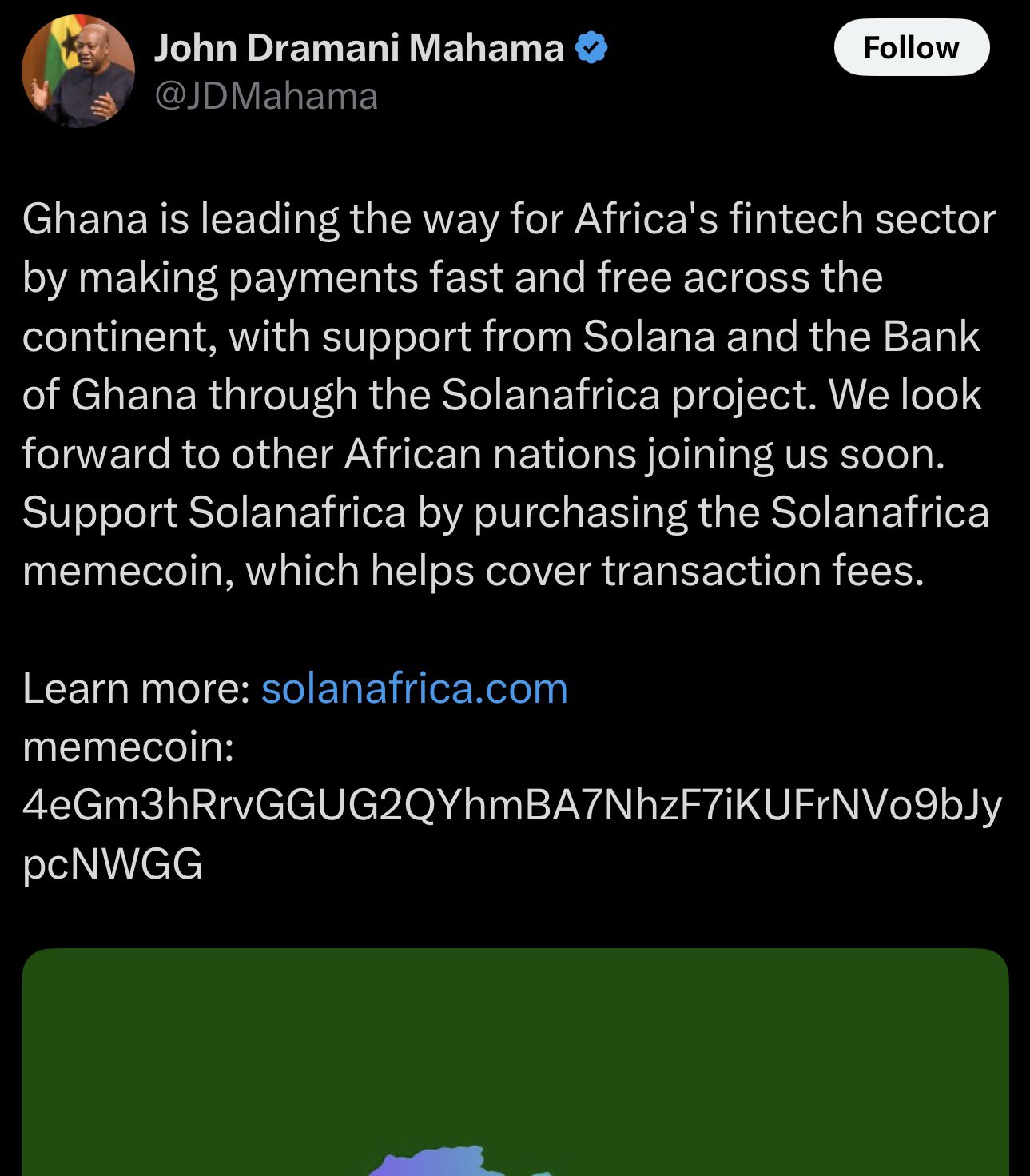Ghana’s President John Mahama’s Twitter (X.com) account was hacked. Here’s a deep dive into the Solana Africa scam.
In a shocking turn, Ghana’s President John Dramani Mahama’s official X (formerly Twitter) account was hacked, leading to the promotion of a fraudulent post about a fake meme coin called Solana Africa. This incident, which unfolded over the past few days, has raised significant concerns about cybersecurity and the integrity of social media platforms in political communication.
 The Hacking Incident
The Hacking Incident
Implications for Cybersecurity and Social Media
Ghana’s President Under Fire as Solafrica Token Collapses
Investors are reeling after the Solafrica (SOL) cryptocurrency experienced what appears to be a classic “rug pull. ” The token’s value plummeted by 9.20% in hours. The price chart shows a dramatic spike followed by a steep decline, leaving the token trading at just 0.00000875 of its paired currency.
The controversy intensified as Ghana’s president, who allegedly promoted the token initially, deleted related social media posts. According to sources, despite this apparent backtracking, the president continues to share content promoting other questionable cryptocurrency projects, including hints at another meme-coin launch.
The Solafrica incident highlights cryptocurrency investments’ volatile and largely unregulated nature, particularly with newer tokens that lack established use cases or fundamental value propositions. The characteristic pattern on the price chart, a sharp rise followed by an accelerated collapse, is typical of schemes where developers abandon projects after collecting investor funds.
Trading volume, shown at the bottom of the chart, indicates initial heavy activity followed by diminishing participation as confidence evaporates. This case warns cryptocurrency investors about the dangers of following hype or endorsements from public figures without thorough due diligence.
Affected investors are reportedly exploring legal options as they face significant losses.
Response from President Mahama and Cybersecurity Experts
President Mahama confirmed the recovery of his account in a tweet, expressing gratitude for the support he received during the incident. His team worked closely with X’s support to restore the account and urged the public to disregard any suspicious cryptocurrency-related posts from the handle. The Cyber Security Authority (CSA) in Ghana is investigating the hack and has taken further steps to prevent future misuse of the President’s account.
Cybersecurity professionals have called for public figures and government officials to reinforce their digital defences. Abubakar Issaka, a cybersecurity expert at Ghana’s Centre for Cyberwatch and Data Protection, warned that two-factor authentication alone is insufficient. He recommended assigning a dedicated team to ensure around-the-clock surveillance of digital platforms.
The incident involving Solana Africa also highlights broader concerns about the impact of meme coins on public perception. Meme coins, often created as jokes or for speculative purposes, have gained popularity but are also associated with high volatility and potential scams.
The collapse of the meme coin frenzy and a broader decline in the digital asset market have contributed to Solana’s sharp price drop. This volatility can erode trust in legitimate cryptocurrency projects and hinder their adoption.
The hacking of President John Mahama’s X account and its exploitation to promote a fake meme coin is a stark reminder of the cybersecurity challenges facing political figures and social media platforms today. It underscores the need for robust security measures and continuous vigilance to protect against such breaches.
As Ghana and other nations navigate these digital threats, the lessons learned from this incident will be crucial in shaping future cybersecurity strategies and ensuring the integrity of online communications.




 The Hacking Incident
The Hacking Incident











